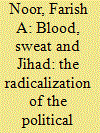| Srl | Item |
| 1 |
ID:
059832


|
|
|
| 2 |
ID:
105475


|
|
|
| 3 |
ID:
101349


|
|
|
|
|
| Publication |
2010.
|
| Summary/Abstract |
The Tablighi Jama'at ranks as one of the biggest missionary movements in the contemporary Muslim world and it has spread its network of itinerant members right across Asia. This paper looks at the spread of the Tablighi Jama'at in and across South East Asia in particular, tracing its early arrival in the 1950s to the present. The author identifies it as one of the many currents of globalization that has brought the region closer together in a borderless world that is now being integrated by the forces of capital. Interestingly, the Tabligh is one example of an alternative form of globalization that is faith-driven, and yet spreads across national political boundaries with relative ease. Understanding the Tablighi Jama'at, plus what motivates its members to opt for an alternative understanding and praxis of normative Islam in an age of mass consumerism and global capital, is one of the aims of this paper.
|
|
|
|
|
|
|
|
|
|
|
|
|
|
|
|
| 4 |
ID:
146532


|
|
|
|
|
| Summary/Abstract |
That the complexity of Malayan society, with its ethnically diverse population and its linguistic, cultural and religious differences, could be simply reduced to ‘practically three races’ that in turn bore three simple essential characteristics – idleness, criminality and drunkenness – is telling of how the order of knowledge and power that had dominated and defined the colony had also reduced its native inhabitants to stock caricatures that were permanently fixed and defined. Knowing the colonised native Other meant being in a position of epistemic leverage over that Other, and thus being able to define and frame the Other in whatever terms that suited the ideological needs of racialised colonial-capitalism at the time.
|
|
|
|
|
|
|
|
|
|
|
|
|
|
|
|